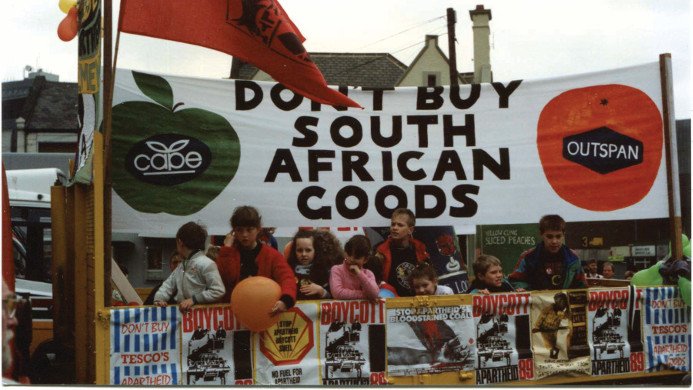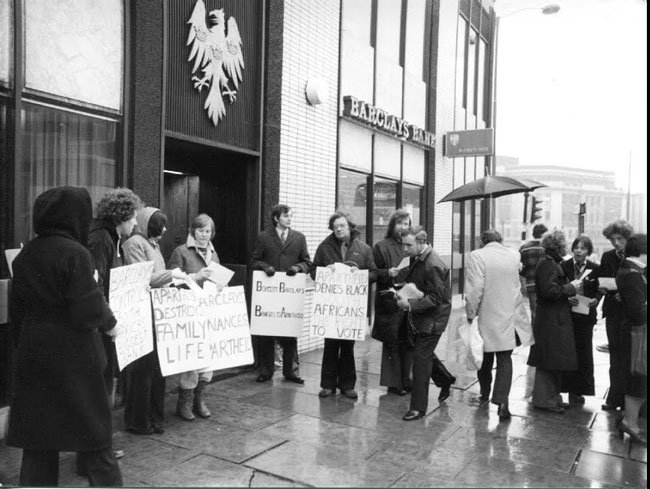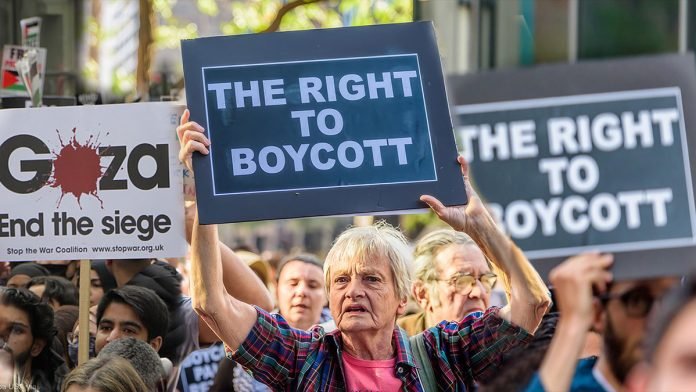The Anti-Boycott Bill: A Menacing Blow to Justice, Rights, and Democracy
In a classic display of government manoeuvring, this week we witnessed the passage of plans to stop UK public bodies from boycotting foreign countries and British companies that trade with them representing a further attack on the right to freedom of expression.
The passage of the Economic Activity of Public Bodies (Overseas Matters) Bill, colloquially known as the ‘anti-boycott Bill.’ Is a piece of contentious legislation that aims to curtail our ethical considerations in procurement and investment by prohibiting local authorities, universities, and public sector pension funds from taking principled stances. For example, boycotting goods from countries we wind that go against our values as people did during apartheid.
Divestment and sanctions have been used to confront injustice historically, including the transatlantic slave trade and apartheid South Africa.
At the heart of the Bill lies clause 1, which seeks to prevent any UK public body from factoring in its political or moral disapproval of a foreign state’s conduct when making procurement or investment decisions. The ramifications of this ill-conceived legislation are significant—a major assault on freedom of expression, an erosion of democratic principles, and a genuine threat to climate and human rights campaigns.
Under this bill, campaigns related to boycotting of goods and services or making choosing not to make investments with banks or funds would effectively be outlawed.
The government has previously highlighted a 2014 motion by Leicester city council to ban goods from illegal Israeli settlements, while the communities secretary, Michael Gove, has used the pretext of the BDS (boycotts, divestment and sanctions) movement targeting Israel to fan the flames of antisemitism.
Standing Against Oppression: Defending the Right to Boycott
Over 60 campaign groups, including Greenpeace, Friends of the Earth, War on Want, and the trade unions Unite, Unison, and the National Education Union, have voiced their opposition to this regressive Bill.
This bill has the potential to weaken campaigns against deforestation, environmental pollution, and the exploitation of children and workers,” warns a broad coalition of groups ranging from trade unions, charities, and NGOs to faith, climate justice, human rights, cultural, campaigning, and solidarity organisations. It raises a crucial question: How can we expect ministers to uphold ethical standards worldwide when they are dismantling our democratic rights at home?
Under the guise of protecting specific countries from economic sanctions, the bill’s central provision, clause 1, delivers a sweeping blow to campaigns for environmental and social justice. Not content with restricting action solely on sanctioned nations, this insidious piece of legislation aims to silence voices that dare to voice political or moral disapproval of foreign states in procurement and investment decisions.
The Positive Impact of Boycotting: Unraveling the Complexities of Anti-Apartheid’s Influence on Ethical Business Practices

The boycott movement against apartheid not only had a profound impact on challenging racial injustice but also played a significant role in shaping contemporary discussions on “fair trade” and ethical business conduct. In the 1980s, the divestment campaign achieved notable successes, such as Barclays’ withdrawal from South Africa in 1986, highlighting the power of multinational corporations. However, it is worth noting that while some companies like BP aimed to promote ethical practices within the country, their efforts were met with mixed opinions.
BP, for instance, produced social reports and invested in black education, garnering support from notable figures like Alan Patton, a renowned white South African opponent of apartheid. The anti-apartheid movement’s journey witnessed both successes and setbacks, sparking debates about the most effective methods to exert pressure on the South African government. Exploring the politics of social movements in the latter half of the twentieth century, the history of anti-apartheid offers valuable insights into the challenges faced by organizations like Occupy Wall Street, Fair Trade advocates, and anti-WTO groups that strive to advance ethical business practices.

Trading Freedom for Convenience
The government’s victory on Monday night came despite opposition from some Tory backbenchers, thanks to a convenient abstention by the Labour Party. Such political acrobatics showcase how interests can conveniently align when it comes to eroding our democratic rights.
Yet, despite the outcry, the legislation managed to pass its second reading in the House of Commons, further progressing along its parliamentary journey. The final tally showed 268 MPs in favour of the Bill and a mere 70 MPs against it.
While Labour abstained on the vote, effectively allowing the measure to pass, only two Conservatives, William Wragg and Crispin Blunt, had the conviction to vote against the government. Astonishingly, 84 Tories chose to conveniently abstain, perhaps more interested in preserving their political careers than defending our democratic principles.
Among the Labour MPs who demonstrated courage by voting against this appalling anti-boycott bill were Apsana Begum, Dawn Butler, Jeremy Corbyn, Barry Gardiner, Ian Lavery, Andy McDonald, John McDonnell, Ian Mearns, Grahame Morris, Mick Whitley, and Beth Winter. Although some others were absent, their opposition to the bill was unmistakable. As for the remaining Labour MPs, well, let’s just say that if you’re in the market for a new moral compass, you know where to find those who are willing to part with theirs.
While we recognise and appreciate the brave few who voted against this appalling bill, we can’t help but wonder about the rest. To those who abstained, your silence speaks volumes. And to those who didn’t bother to vote at all, it’s as if you willingly traded your principles for a bag of magic beans.
Abstention doesn’t absolve parliamentarians from their duty to uphold the core tenets of democracy and protect our freedoms. It’s a shame that some elected representatives appear more eager to appease those in power than to stand up for the principles they supposedly represent.
If allowed to continue in its legislative journey, this draconian law will crush an extensive array of campaigns that stand up against the arms trade, fight for climate justice, champion human rights, uphold international law, and express solidarity with oppressed communities in their struggle for justice. Make no mistake, this proposed legislation poses a grave threat to freedom of expression and the very essence of democratic institutions.
By seeking to curtail the ability of public bodies and democratic institutions to spend, invest, and trade ethically in accordance with international law and human rights, this bill undermines the core values we claim to uphold. It aims to silence the voices that dare to boycott in pursuit of justice and erode our right to challenge oppressive systems.
We hereby demand that the UK government immediately halts the progress of this bill. We demand that the Labour Party do more than abstain in the face of injustice watching as our liberties are stripped away.
We call upon all opposition parties to vehemently oppose its passage, and we urge civil society to rise in unified support of our sacred right to boycott in the name of justice. This is a battle we cannot afford to lose, for the consequences, extend far beyond the realms of legislation. Our fundamental principles of fairness, accountability, and human dignity hang in the balance.
Support Independent Journalism Today
Our unwavering dedication is to provide you with unbiased news, diverse perspectives, and insightful opinions. We're on a mission to ensure that those in positions of power are held accountable for their actions, but we can't do it alone. Labour Heartlands is primarily funded by me, Paul Knaggs, and by the generous contributions of readers like you. Your donations keep us going and help us uphold the principles of independent journalism. Join us in our quest for truth, transparency, and accountability – donate today and be a part of our mission!
Like everyone else, we're facing challenges, and we need your help to stay online and continue providing crucial journalism. Every contribution, no matter how small, goes a long way in helping us thrive. By becoming one of our donors, you become a vital part of our mission to uncover the truth and uphold the values of democracy.
While we maintain our independence from political affiliations, we stand united against corruption, injustice, and the erosion of free speech, truth, and democracy. We believe in the power of accurate information in a democracy, and we consider facts non-negotiable.
Your support, no matter the amount, can make a significant impact. Together, we can make a difference and continue our journey toward a more informed and just society.
Thank you for supporting Labour Heartlands









